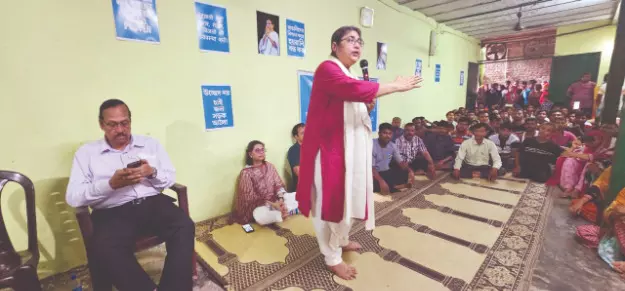
New Delhi, July 14 -- In a display of solidarity, four Trinamool Congress (TMC) Rajya Sabha MPs organised an overnight protest in South West Delhi's Vasant Kunj area in support of residents of Jai Hind Colony who are going through what has been termed by many as a serious humanitarian and identity crisis.
The sit-in commenced on Monday afternoon and continued late into the night. Conducted by TMC MPs Sagarika Ghose, Dola Sen, Sukhendu Sekhar Roy, and Saket Gokhale, the law-makers pledged to keep up the 24-hour dharna, seeking justice and accountability for the Bengali-speaking migrant families residing in the locality.
Jai Hind Colony has long been home to a thriving community of Bengali-speaking migrants, many of them from Cooch Behar and other districts of North Bengal. Used primarily for household work and sanitation services, these families now stand poised on the edge of displacement.
The colony has been plunged into darkness for the last week after power and water supplies were suddenly cut off, supposedly as part of an ongoing eviction campaign. The authorities have justified the action by referring to court instructions, while local citizens and political activists have referred to what they see as a targeted campaign against Bengali-speaking immigrants in the guise of a legal process.
The issue turned ugly with reports emerging that residents-although possessing valid Aadhaar and voter ID cards-were being referred to as "illegal infiltrators." The events have invited stern criticism from West Bengal Chief Minister Mamata Banerjee. The targeting of Bengali-speaking people in BJP-governed states was condemned in a strongly worded statement by Banerjee. "There are more than 1.5 crore migrant workers from Bengal working with dignity all over the country. In BJP-ruled states, they are being termed infiltrators just because they speak Bengali. Speaking Bengali does not make one Bangladeshi," she added.
As per the directive of the chief minister, a three-member delegation of TMC - Sagarika Ghose, Sukhendu Sekhar Roy, and Saket Gokhale - went to the colony on Sunday. The delegation spoke to the residents, offered them moral support, and promised them legal help wherever necessary.
The residents of Jai Hind Colony have reacted with resilience and courage despite the bleak situation. A number of them attended the TMC protest to speak out about their pain and frustration. Their paperwork is proper, they claim, but that has not prevented officials from doubting their citizenship.
In the recent Delhi Assembly polls, residents recalled, Delhi Police officers went from door to door seeking proof of citizenship. In a few cases, officials even visited their birthplaces in West Bengal to check their status. Even though they were eventually permitted to exercise their franchise, the harassment has not stopped.
The latest shock was the stoppage of electricity for most houses in the colony without prior notice. This has further deteriorated already unhygienic conditions. Piled-up garbage, stagnant pools of water, muddy roads, and sheds are the hallmark. Scavenging and rag picking are the main sources of livelihood for most of the residents. The colony nestles on the outskirts of the capital, forgotten and abandoned, a place which contrasts with Delhi's fast-modernising skyline.
Inhabitants also remembered a devastating fire that ravaged the colony in 2014, when the UPA government was in power.
Then, the government assured that it would construct permanent dwellings for the affected. Yet, 11 years later, thousands of Bengali-speaking residents are still in the same precarious situation.
The problem has now created political tensions, with West Bengal Leader of the Opposition Suvendu Adhikari pointing fingers at Mamata Banerjee and TMC for politicising the crisis. For those in Jai Hind Colony, however, political blame politics are inconsequential when fundamental needs-electricity, water, roof over their heads and dignity-are being withheld from them.
While the TMC-organised protest goes on, the larger argument regarding the rights and status of Bengali-speaking migrant labourers in Delhi gains momentum.
The course of events in Jai Hind Colony highlights not just the vulnerability of migrant life in the city but also the wider tensions at play regarding migration, identity, and citizenship in the contemporary polarised political atmosphere.
Later in the day, TMC tweeted: "The protest dharna at Jai Hind Colony, Delhi, commenced today in solidarity with Bengali-speaking families who, despite possessing valid documentation, are being unjustly branded as 'illegal' and pushed to the margins of society. Residents of the colony joined us with remarkable courage and conviction, standing up for their identity and dignity. Smt. @sagarikaghose, Shri @Sukhendusekhar, Smt. @Dolasen7, and Shri @SaketGokhale are leading the protest on the ground, demanding answers, accountability, and justice."
Published by HT Digital Content Services with permission from Millennium Post.
